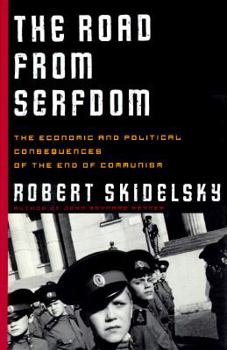The Road from Serfdom: The Economic and Political Consequences of the End of Communism
Select Format
Select Condition 
Book Overview
The fall of communism at the end of the 1980s was hailed as a triumph for Western capitalism, but initial euphoria soon turned to pessimism as the West failed to react adequately to the momentous... This description may be from another edition of this product.
Format:Hardcover
Language:English
ISBN:0713991224
ISBN13:9780713991222
Release Date:February 1996
Publisher:Viking Books
Length:214 Pages
Weight:1.06 lbs.
Dimensions:0.8" x 6.2" x 9.3"
Customer Reviews
3 ratings
A Sophisticated Analysis of the Flaws of the Soviet System
Published by Thriftbooks.com User , 15 years ago
This work does a masterful job of debunking the ludicrous arguments by prominent Western economists (of a Leftist persuasion) that the Soviet system actually worked. The title is an interesting counterpoint to Frederick Hayek's Road to Serfdom.
The rise and fall of collectivism
Published by Thriftbooks.com User , 20 years ago
'Where to draw the borders of the state?' is the central question of this book. Keynes's autobiographer explains perfectly the essential differences between collectivism and classic liberalism. He sees the reason for the attraction of collectivism in World War I, where political and economical life was directed by the state. The war itself gave also the opportunity for collectivists to seize power. The collectivist system in the USSR showed in the beginning at least a mixed success, certaily when compared to a West in deep trouble (the Great Depression). But ultimately the system collapsed, because investments became unprofitable and irrational (a nail of one ton was as good as millions of nails) and also because productivity growth was discouraged. After the collapse, a liberal shock therapy was implemented which the author explains very well, but he sweeps the human side of the change (vast unemployment and a steep drop in the living standard) under the rug. The failure of collectivism led to the mistaken view that everything should be left to market forces. But monetarism showed also its limits with failures in the capital and labour markets. For the author, a liberal democracy is not the ideological endpoint of history (Fukuyama's pipedream). Keynes's remedy of state intervention is far from dead. A lot happened after the publication of the book: the Euro became a reality; the EU was enlarged (but farm subsidies not lowered); Russia became authoritarian and China an economic world player. The author pins his hope on the pacifying potential of economic freedom and on mini-computerization with its tremendous influence on human freedom. This book is an excellent analysis of an extremely important economic failure. Not to be missed.
A good book for disillusioned liberals
Published by Thriftbooks.com User , 26 years ago
Thirty years ago I would have identified myself as "A" liberal. Now I say I am liberal, but I can't identify with modern-day liberalism. Sometimes I say that I am a 19th century liberal. Until I read this book, I found this confusing. The author shows that liberalism has been co-opted by collectivists (socialists) who have perverted the original liberal ideal. Skidelsy's analysis of historians, philosopers, sociologists, and priests is exquisite (p. 163), and his conclusion about the difference between capitalist democracies and communist countries is profound (p. 196).Liberalism was originally an ideal that promised to liberate people from supersition, servitude, and ignorance. It has turned into a system that is having the opposite affect. I infer from this reading that there is a natural tension between the halves and the half nots. However, economists and social planners are just a bunch of thirds. This a book well worth reading.






